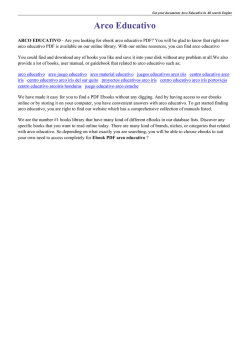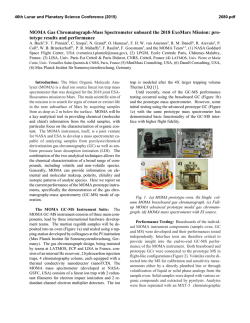
¿Cómo será ARCO 2014? - N2 Galería
M MERCADO / MARKET ENTREVISTA / INTERVIEW AFTERARCO 9915, EL ROL DE LOS COLECCIONISTAS 9915, THE ROLE OF COLLECTORS EVAN ROTH, LA BONDAD DEL «HACKER» EVAN ROTH, THE GOOD OF HACKERS OPEN STUDIO 8.0 Y «DÚPLEX» OPEN STUDIO 8.0 AND «DÚPLEX» [ 06 ] [ 10 ] [ 11 ] DOMINGO 17 DE FEBRERO DE 2013 / SUNDAY, FEBRUARY 17th, 2013 twitter: @ABCDARCO2013 ABCDARCO ¿Cómo será ARCO 2014? What will ARCO 2014 be like? 10 ABCDARCO 17 de febrero de 2013 «La red es arte por ser parte de la vida» “Internet is art because it’s part of our life” puede interpretar que el píxel forma parte de internet y entenderse como algo físico. Este sería un buen tema para tratar en ARCO. F or the first time, Evan Roth (Michigan, 1978) visits ARCOmadrid to talk about contemporary art and the Internet. Based in Paris, this Northamerican artist, a flag-bearer for the postgraffiti movement, is setting trends all over the world. In 2012 he won the National Design Award and his work has been seen at MoMA, the Pompidou and the Tate. He is the co-founder of Graffiti Research Lab, a collective where Roth can do what he likes best: take art to the streets. CRISTINA SÁNCHEZ P or primera vez, Evan Roth (Michigan, 1978) pisa ARCOmadrid para hablar de arte contemporáneo e internet. Afincado en París, este norteamericano emblema del movimiento posgrafiti está marcando tendencia en todo el mundo. En 2012 obtuvo el premio que concede el National Design Museum de Nueva York y sus suelas han recorrido ya el MoMA, el Pompidou o la Tate. Es cofundador de Graffiti Research Lab, un colectivo con el que Roth hace lo que más le gusta: poner el arte en la calle. Recala en uno de los foros de expertos de ARCO como artista e investigador. ¿Qué cree que ha aportado a la cita? Aunque no conocía la dirección que iba a tomar el encuentro, me gustaba la idea de aportar mi experiencia en la unión entre el arte e internet. Hay mucho interés por lo que está pasando actualmente en este terreno, y un profundo debate sobre cómo puede ir creciendo el arte con el uso de los ordenadores, ya que no es solo una cuestión técnica, sino también cultural y sociológica. Se considera una mezcla entre artista y hacker. ¿Qué entiende por un hacker el Graffiti Research Lab? A diferencia de lo que tradicionalmente se entiende por un hacker, aquella persona que manipula códigos para hacer un uso indebido o robar datos en internet, nosotros trasladamos la pantalla del ordenador a otros lugares con el fin de hacer algo diferente. Lo que hace interesante que el hacking se relacione con el arte es permitir a la gente que vea la vida desde otro punto de vista, cambiando la perspectiva y el escenario. No todos pueden presumir de haber en- trado en el MoMA a su edad. ¿Cómo fue? Mi muestra se tituló Talk to Me y constaba de dos obras que eran parte de un proyecto en colaboración llamado Eye Writter, que permite a personas con parálisis pintar grafitis con el movimiento de los ojos. La tercera pieza fue Graffiti Taxonomy, que ha estado también recientemente en una galería de Barcelona -N2-. Esta obra, que conecta París y Nueva York, presenta letras aisladas realizadas por distintos grafiteros de ambas ciudades. La idea era ver cómo cada uno de ellos escribía el mismo carácter, mostrar la diversidad de interpretaciones. ¿Qué pretende comunicar con sus intervenciones en el espacio público? En los espacios públicos utilizo tecnologías que no es habitual encontrarse en ese contexto. Deseo mostrarlos como sistemas abiertos que permitan comunicarse visualmente, y con ello fortalecer la percepción de las personas de formas de las que antes no disponían o a las que no tenían acceso. ¿Es el píxel la nueva expresión del arte? Sí y no. Creo en todo caso que internet es tan importante en nuestra vida actual que es una parte del arte. Internet es una utopía, y se Sobre estas líneas, la obra de Evan Roth titulada «Gold». Arriba, el artista junto a «When we were kings», creada a partir del juego del solitario de Windows Above these lines, Evan Roth’s work called “Gold”. On top, the artist next to “When we were kings”, inspired in Windows’ solitaire game You are appearing at one of ARCO’s expert forums as an artist and researcher. What do you think you can contribute to? Although I don’t know what direction the meeting will go in, I’d like to contribute my experience at the meeting place between contemporary art and the Internet. There’s a lot of interest in what’s going on at the moment, and a deep debate on how art can grow with the use of computers, not just as a technical matter, but in cultural and sociological terms. You are considered to be a combination of artist and hacker. What does Graffiti Research Lab regard as a hacker? Unlike what is normally understood by hacker, a person who uses codes to abuse the Internet or steal online, we take the computer screen to other places in order to do something different. What makes it interesting for hacking to be related to art is that it lets people see life from another point of view, changing the perspective and the setting. Not everyone can boast of having their work in MoMA at your age. What was it like? My show was called Talk to me and it consisted of two pieces, part of a collaboration project called Eye writer, which lets people with paralysis paint graffiti with eye movements. The third piece was Graffiti taxonomy, which was recently also shown in a Barcelona gallery, N2. This work, which connects Paris and New York, presents single letters made by different graffiti artists in both cities. The idea was to see how each of them writes the same character, showing the diversity of interpretations. What do you seek to express with your interventions in public spaces? In public places use technologies you don’t usually find in that context. I want to show how open systems can let people communicate visually, and strengthen people’s perception in ways that were not available to them before, or they had no access to. Are pixels the new expression of art? Yes and no. I think in any case the Internet is so important in our life these days that it’s a part of art. The Internet is a utopia, and pixels can be construed as forming part of the Internet and understood as something physical. That would also be a good subject to discuss at ARCO.
© Copyright 2026




